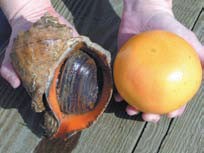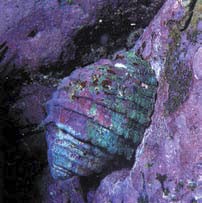Rapa or veined whelk (Rapana venosa) preys on native and aquaculture species. It can affect the composition of bottom-dwelling communities.
What to look for
Features:
- grey to red-brown shell
- black vein-like pattern
- deep orange interior
- large and heavy
- short spire
- up to 18cm.
Where to look
Look in or around:
- hard surfaces
- sand.
Likely habitats include:
- shores and shallow waters.
Similar native species
These native species look similar to Rapa or veined whelk. They do not need to be reported.
Cartrut shell (Dicathais orbita)
Features:
- grey-brown to green
- sculpted with prominent grooves
- up to 8cm.
Habitat:
- rocky reefs
- shores and shallow waters, up to 10m depth.
Commonly found throughout southern Australia, from southern Queensland to Barrow Island, Western Australia, and Tasmania.
Helmet shell (Semicassis pyrum)
Features:
- cream with brown blotches
- smooth helmet shell
- up to 7cm.
Habitat:
- buried in sand during the day, feeds at night
- up to 480m depth.
Known locations are from New South Wales to Fremantle, Western Australia, and Tasmania.
Report it
See something unusual? Report it. Even if you’re not sure.
If you see something you think is a pest:
- note the exact location (screenshot your map app or enable photo geotagging on your phone)
- take a photo (use something for size reference, like a coin or note)
- contact your state or territory authority.
Stop the spread of marine pests
Start with these simple steps:
- Inspect and clean your boat or yacht. Make sure you check hard to reach areas.
- Treat the hull of your boat or yacht regularly.
- Clean and dry your fishing and diving gear after every use.
How you can stop the spread of marine pests.
Your location
The map shows known pests and pests to look for around Australia.






